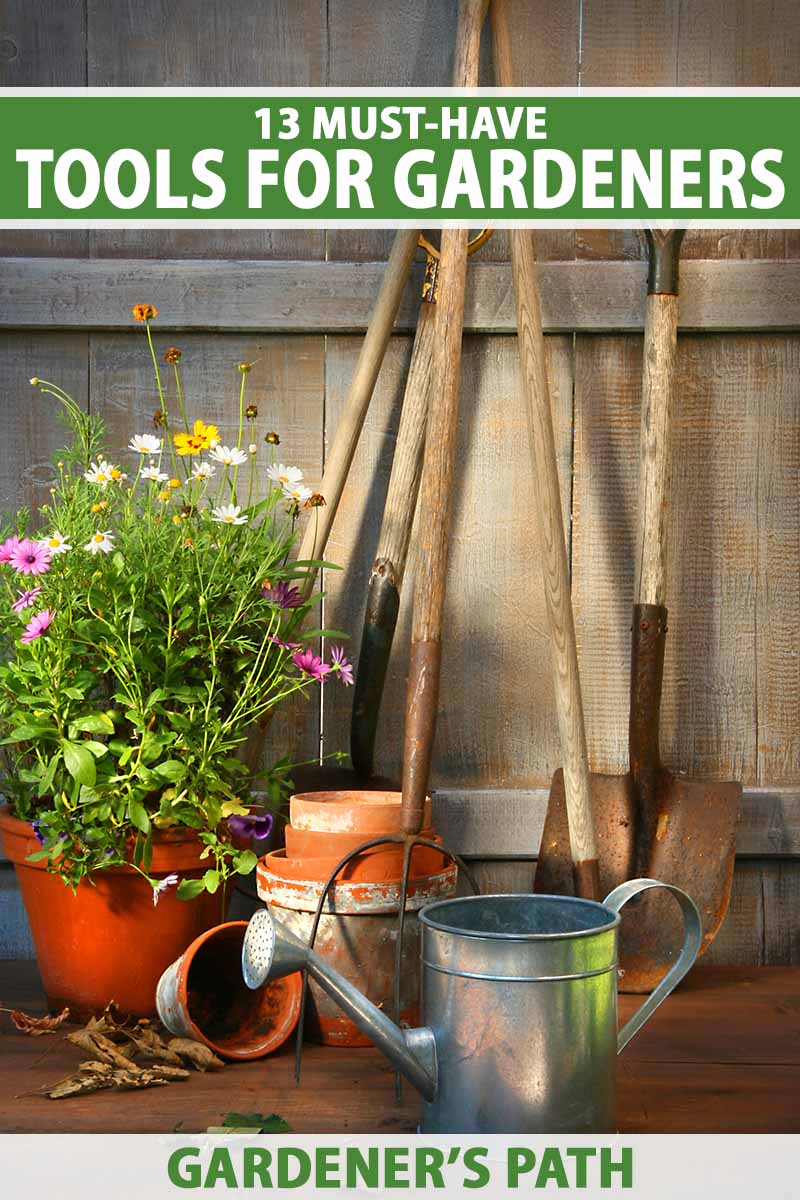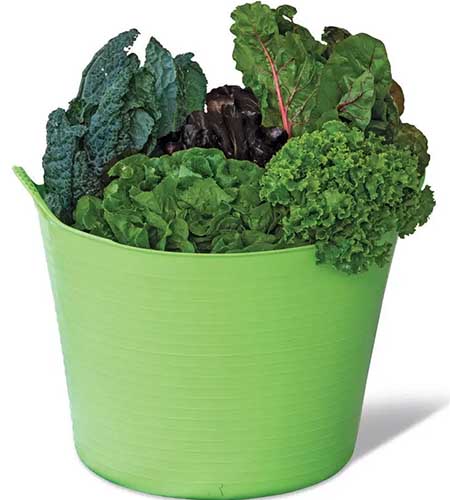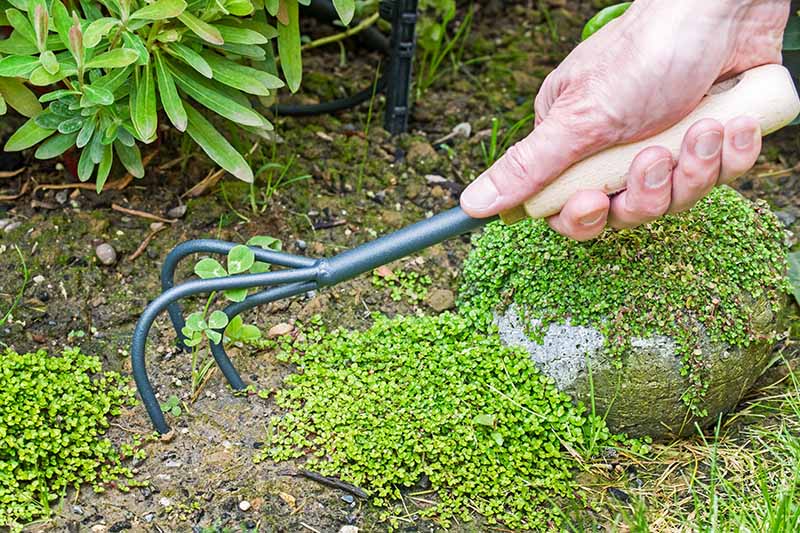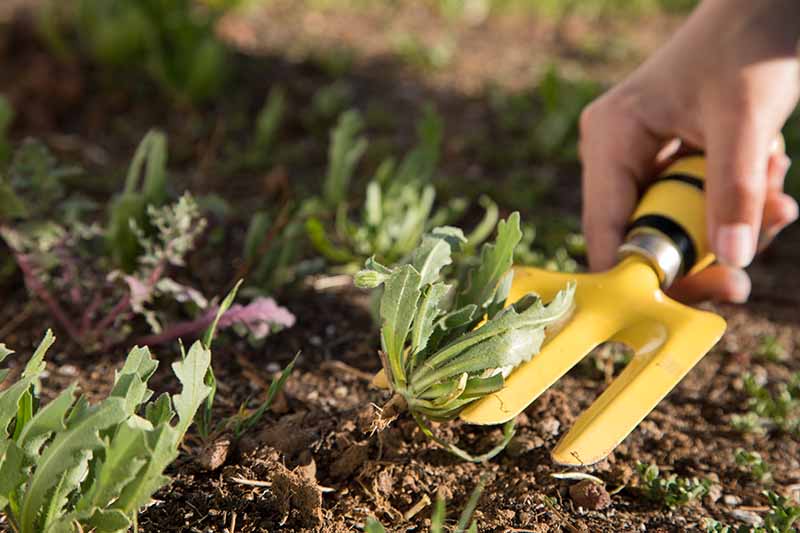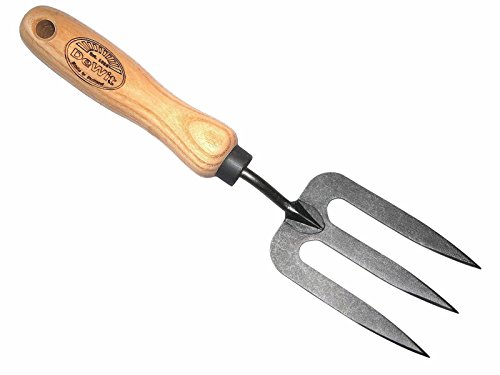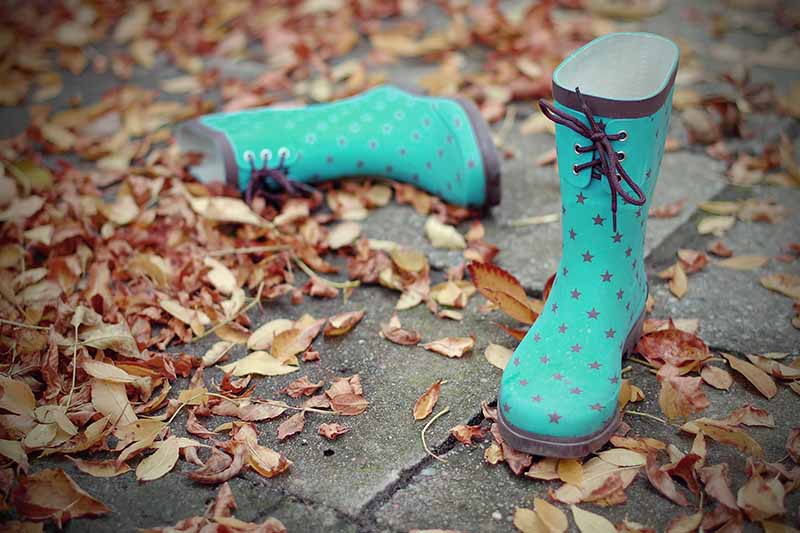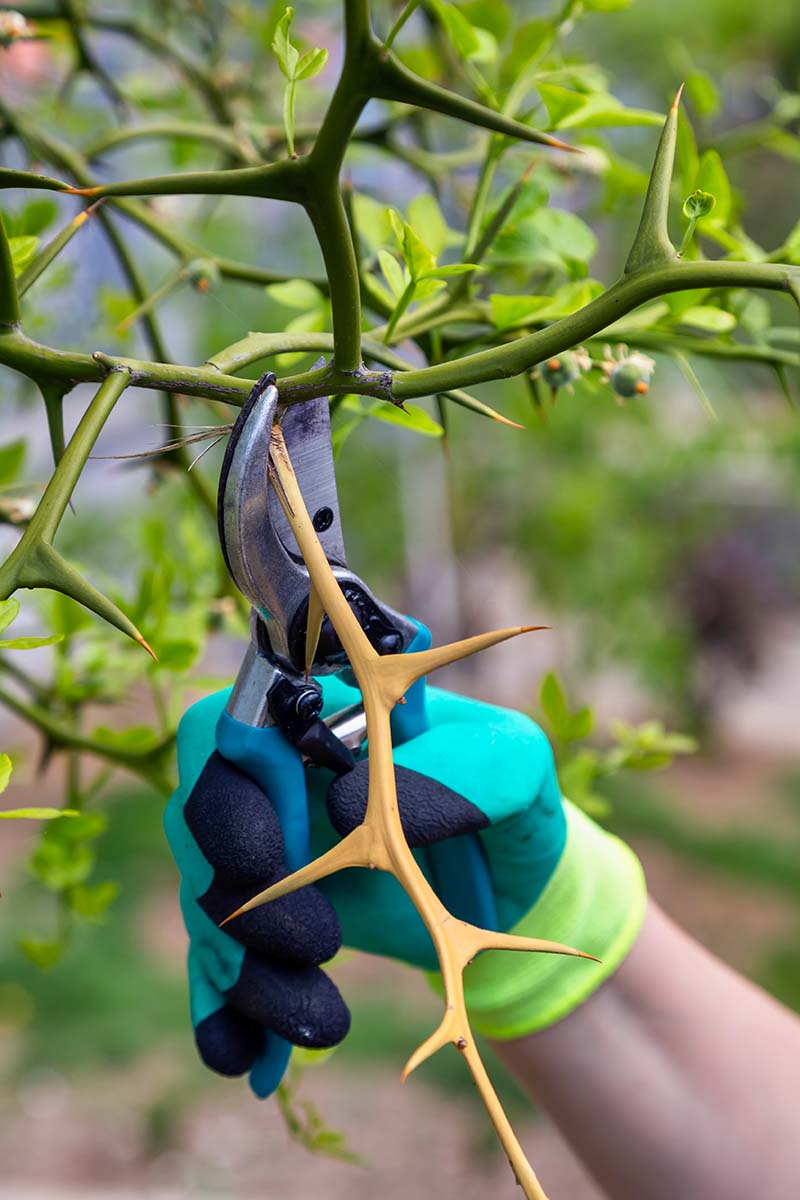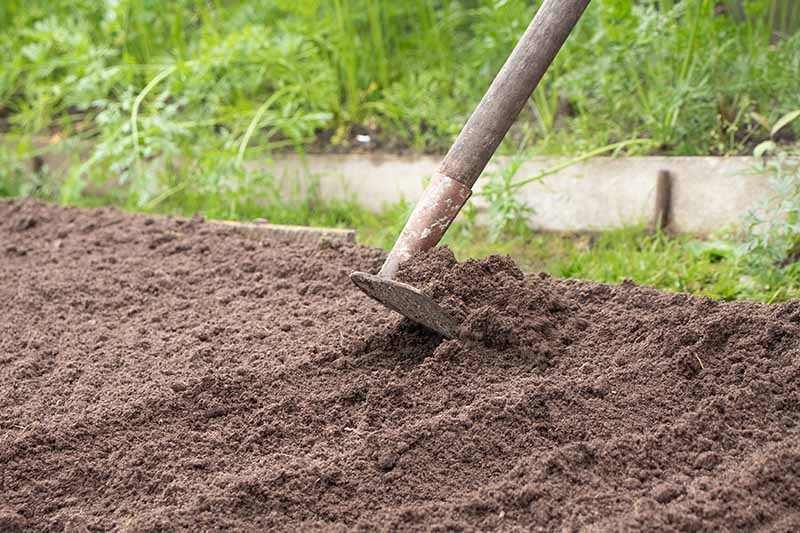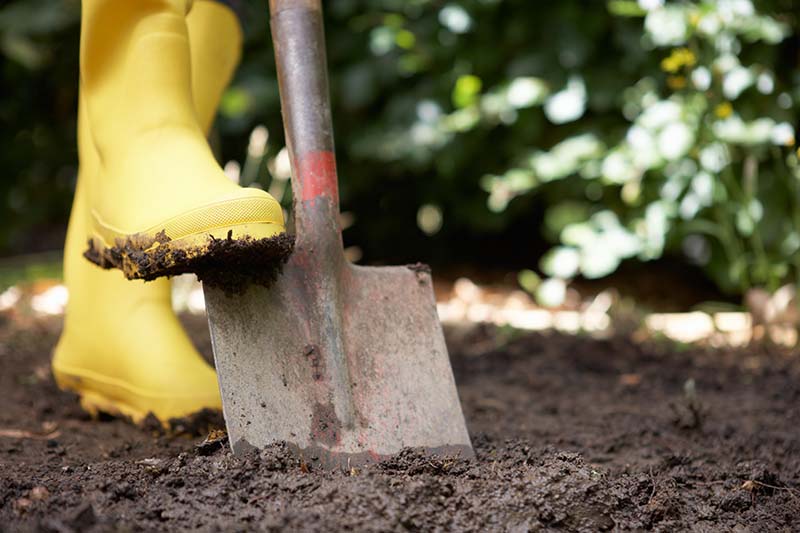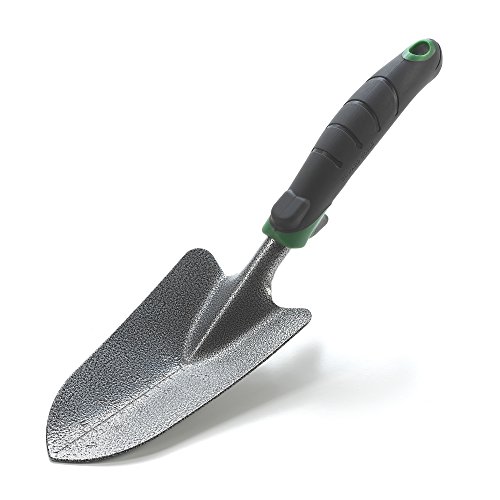Their unique features are suited to chores like digging, planting, pruning, and weeding. Using them correctly can help save time, money, and energy, making gardening a pleasant experience. We link to vendors to help you find relevant products. If you buy from one of our links, we may earn a commission. In this article, we present a baker’s dozen of essential garden tools, with descriptions of their functions, plus suggestions for where to purchase your favorites, and how to shop for quality products. Let’s get going! As you consider items for purchase, look at how they’re made. The fewer pieces there are, generally the better the construction. This is particularly true of small hand tools, like trowels and knives. An implement that is constructed in one piece, known as “full-tang,” is typically the least likely to break. If you are considering a wood-handled piece of equipment, look for strong hardwood like ash or hickory that is unlikely to snap or splinter. Materials like aluminum and steel are time-tested and reliable. Many of the newer fiberglass models are proving themselves worthy of consideration, as well. Ergonomic design, like bent and/or cushioned handles, as well as the weight of the implement are also features to evaluate. Good equipment can be expensive. Shop with a budget, and opt for a few pieces that are made very well, rather than an array of gear that isn’t likely to last. Be sure to review all warranty information, as some manufacturers offer lifetime repair or replacement. And now, on to the essentials! It’s not necessary to have a large stockpile of gadgets to garden successfully. A few well-constructed, versatile items are all you need for most routine tasks. Here are the 13 garden essentials that we recommend:
1. Bucket
Don’t laugh. While it may not be rocket science, a good bucket equals reliable transport. It’s perfect for:
Caddying hand tools to beds and bordersCarrying compost or mulch for spreadingFerrying perennial transplants around the yardHolding fresh cut flowers in waterWatering new shrubs
Choose durable galvanized aluminum if you’re up to hefting it, or lighter weight plastic. They hold water, and when you draw the handles together, you create a handy pour spout at both sides for watering plants. A variety of sizes and colors are available. By definition, a trug is a shallow wooden flower or harvest basket. This modern take offers a wide range of uses. Flexible Plastic Tub Trug This product from Gardener’s Supply Company measures just over 17 inches wide by 13 inches tall. It holds 39 liters, or about 11 gallons. TubTrugs are made of lightweight, durable polyethylene. They are frost and UV resistant. Find an 11-gallon capacity Tubtrug from Gardener’s Supply Company. Choose from blue, green, orange, pink, purple, and red.
2. Cultivator
A hand-held cultivator has three to five prongs, or tines, that are bent like a claw. Typical cultivator tasks include:
Breaking up soilDislodging rocksLoosening vegetables for harvestMixing in soil amendmentsRemoving weeds
A hand cultivator may be made of materials like aluminum, carbon steel, fiberglass, plastic, stainless steel, and wood. In addition to hand-held cultivators, there are dual implements available as well, with a cultivator on one side, and a hoe blade on the other. There are also long-handled versions for those who prefer to avoid bending. Some handles “telescope,” or lengthen, for custom comfort. The Gardener’s Lifetime Cultivator, available from Gardener’s Supply Store, is made from high-carbon Swedish steel. Its four-inch tang extends into the hardwood handle fashioned from European ash. Gardener’s Lifetime Cultivator This robust product is 11 inches long, with a three-inch claw, and features a hole in the handle for easy storage. It comes with a lifetime guarantee for peace of mind. Explore a variety of hand-held models with our buying guide. A tool that is similar to the cultivator is the hand fork. Instead of having narrow bent tines, it has wide straight ones. In addition to the tasks above, the downward pressure exerted on the hand fork’s straight tines is useful for loosening soil before planting or transplanting, and unearthing more deeply rooted weeds. The DeWit Forged Hand Fork is made from tempered boron steel which won’t bend when digging in dense soil. The hardwood handle is made from European ash, and is ergonomically designed for a comfortable grip. DeWit Forged Hand Fork This product is 10 inches long from the tip of the tines to the end of the handle, and the head is two and a half inches wide.
3. Footwear
As someone who has ruined more than one pair of shoes in the yard, I highly recommend not only a dedicated pair, but one that is especially made for the job. Footwear made for gardening offers the following benefits:
Comfort during long gardening sessionsEasy clean-upReduced pathogens in and on shoes that may adversely affect plants
Street shoes made of non-washable materials can track in trouble, in the form of pathogens from the garden. In addition, they may be easily ruined by grass, mud, and pollen stains. Footwear only worn in the yard and cleaned after each gardening session, per manufacturer’s instructions, is less likely to harbor disease. One of our favorites is the Muckster II Ankle Muck Boot that as the name suggests are ankle-height, made from waterproof neoprene with a robust rubber sole. Muckster Ankle Muck Boots You can learn more about these gardening shoes in our review. Hop over to our roundup of garden footwear for some more top-notch products.
4. Garden Rake
A garden rake is different from a leaf rake. It has a firm rectangular head of tines, rather than a flexible fan-shaped head. Both sides of the rake are useful. Use the robust tines to:
Dislodge rocks, roots, and weedsRemove dead grassSpread soil or amendments like compost and mulch
The flat side of the head is used to:
Bury sown seedsMake furrowsSmooth the soil in preparation for planting
There are various head sizes, tine lengths, and handle lengths that range from short, hand-held ones to long-handled models. Tines may be straight or curved, with tines that are wide set or close. The bow type of garden rake has a curved metal support that joins the head to the handle, adding strength. This, plus close-set tines, makes it suitable for spreading heavier material, such as pathway gravel. Here is a commercial grade, long-handled, bow-shaped garden rake with a lightweight and durable triple-walled reinforced fiberglass handle. Bully Tools 12-Gauge, 16-Inch Bow Rake The head has 16 tines made of durable 10-gauge steel, with a welded ferrule (the part the handle fits into) that is extended up the handle, to add increased strength and resistance to breaking. Overall dimensions are 58 by 16.25 by 3.5 inches. The manufacturer offers a limited lifetime warranty.
5. Gloves
I used to think garden gloves were a luxury, until skin rashes and blisters made me realize that hand protection is important. And while you may be tempted to use an old pair of winter gloves, or kitchen rubber gloves, I recommend against it, because they don’t grip, breathe, wash, or last like a good pair of gloves crafted specifically for garden use. For fine work, like sowing seeds and thinning seedlings, you’ll want hand protection that doesn’t impede your ability to be precise in your motions. The addition of a rubberized layer will enable you to have a solid grip on hand tools, as well. Here’s a pair you may like, from Second Skin available via Terrain. Second Skin Garden Gloves Unlike the floppy cotton gloves I grew up with, this water-resistant product is made of stretchy lycra and nylon with UV protection. Silicone grips make for a secure grasp. The gloves measure a generous 3.5 by 10.5 inches each, to protect wrists as well as hands. They are machine washable. Find Second Skin Garden Gloves from Terrain now. They are available in medium size. Choose from olive green, blue, or chartreuse. For occasional heavy-duty chores, like digging new beds, tree pruning, and disposing of thorny branches, a pair of thick leather gauntlet-style gloves that cover the hands and forearms are your best choice.
6. Hoe
You know that tool Mr. MacGregor used in his vegetable patch? The one Peter Rabbit got chased out of? That’s a hoe. A traditional style hoe has a flat blade with a sharp bottom edge that points downward. The user bends slightly forward, extends the hoe, and brings it down to bite into the soil, and then drags it toward them. Tasks to do with a hoe include:
Covering seeded furrowsCutting sodCreating furrows for seedingRemoving rocksSevering and unearthing roots and weedsTilling, or breaking up soil for planting
This is one of the oldest garden tools. There are hand-held and long-handled options, as well as the hoe/cultivar combos mentioned already. Blade styles vary widely and include unique styles like the flat collinear that requires no bending, triangular Warren, and hollow stirrup. They may be straight or curved, wide or narrow. The Rogue Hoe has a sturdy 60-inch ash handle. Its key feature is the one-piece head and ferrule (the part that the handle fits into) for exceptional break resistance. Rogue Hoe The steel blade measures seven inches across and has a sharp bottom and sides. Originally designed for cotton cultivation, this sturdy tool is one to pass down to the grandkids.
7. Hori Hori Knife
Long, narrow, and razor sharp, a well-cared for Japanese gardening knife, known as a hori hori, is an indispensable backyard tool. It consists of a single blade that is serrated on one edge and smooth on the other, and comes to a point at the end. The blade is typically seven to eight inches long and slightly concave. Multiple uses of the hori hori include:
Bulb sowingCutting lawn sodDiggingDividing perennialsPruningSmall-scale edgingTransplantingWeeding
Look for one with a full tang – a blade that runs the full length of the handle. This construction is the most resistant to breakage. Some products feature measurement markings, as well as accessories like holsters and sharpeners. The DeWit Hori Hori knife is constructed from Swedish high-carbon boron steel and a hardwood handle made from European ash. It features full-tang construction for durability and comfort. DeWit Hori Hori Knife This product features an overall length of 13 inches, and a blade that’s one and half inches wide. Find the DeWit Hori Hori Knife available from the Gardener’s Supply Store. You’ll find five of the best hori hori knives in our guide.
8. Hose
Even if you have a trub trug that holds water, you’ll want to have a garden hose, and ideally, a multi-setting nozzle. Choose a length that will allow you to reach the far corners of your property, or attach several as needed. Hose materials vary, and include fabric, plastic, and rubber. Those with three- to four-ply thicknesses and brass fittings are among the best quality products. Consider the weight of the item you plan to purchase, as well as how you will store it both during the growing season, and in the off-season. Be sure to evaluate some of the latest lightweight flexible hoses that deflate when empty for easy transport and storage. In addition to the coiled hose, you may want to think about options like drip irrigation or soaker hoses, if you don’t have the time to stand and water plants yourself. The Flexzilla Pro Water Hose has a diameter of five-eighths of an inch and is made from a flexible polymer designed to minimize kinks. Flexzilla Pro Water Hose It’s available in a variety of lengths from three to 100 feet. The manufacturer offers a limited lifetime warranty. Learn about seven of the best garden hoses, how to extend the life of a garden hose in our guides, and check out our roundup of the best garden hose reels. As for a nozzle, they vary from brass ones that you turn to regulate the spray, to plastic or metal heads that have settings ranging from a hard blast to a fine stream. Some hoses have an integrated nozzle.
9. Moisture Meter
While it may seem like a luxury, a soil moisture meter, or hygrometer, helps take the guesswork out of deciding when it’s time to water. Water stress is a major cause of plant decline. Too much can cause plant tissue and roots to oversaturate. Too little can lead to desiccation, or drying out. Both conditions render plants vulnerable to pests and disease, as well as premature death. A soil moisture meter has a probe attached to a digital or needle readout screen. When the probe is gently inserted into garden soil or container potting medium, it registers the average moisture content. Some products also indicate soil pH and light exposure. The Hydrofarm Active Air 3-Way Meter, available at Arbico Organics, displays available light as well as a pH reading of between 3.0 to 8.0. Hydrofarm Active Air 3-Way Meter It provides a moisture reading in less than one minute and doesn’t require batteries. Simply insert the six-inch probe into the soil and you’ll learn whether or not your plants need additional irrigation. You’ll find nine of the best soil moisture meters in our product roundup, both battery and non-battery powered. Our guide to using a soil moisture meter has all you need to know about the use and care of this garden essential.
10. Pruners
A good pair of pruners, aka shears or secateurs, is another necessity. Whether you want to cut some stems for a bouquet, or prune your forsythia after it blooms, if you carry your shears as you walk your property, you’ll almost always find something to snip. Bypass pruners are a popular choice for all-purpose cutting. They have blades that crisscross during the cutting process, resulting in a clean, smooth slice that promotes the healing of the “wound,” and thereby the health of the plant. If you have perennials to deadhead and rose plants that require regular pruning, this type of tool may be a good choice for you. Felco F-2 Pruners Felco F-2 pruners feature steel blades and forged aluminum handles covered in red rubber for cushioned, lightweight comfort. You can learn more about the Felco F-2 in our review.
11. Shovel
A shovel has two pieces: a head, or blade, and a handle. It may be a short handle with a T- or D-grip, or a full-length version. Lengths and head sizes vary widely. The head of a shovel may be concave and triangular or flat and rectangular. The triangular type has two sharp edges that come to a point. The rectangular one has one sharp front edge, and is often called a spade. Both types may have a ledge on top of the head for resting your foot, to gain leverage and exert force when pushing it into the ground. Uses for triangular blade shovels include:
Digging large holes for new perennials and shrubsDigging and turning soil for new bedsScooping soil or soil amendmentsSevering rootsUnearthing rocks
Flat-head shovels, or spades, make straight slices. They are well-suited to:
Cutting sodEdging garden bedsScooping compost, mulch, and soil
Depending upon your needs, either – or both – types of shovel may suit you. As triangular digging shovels tend to be heavier than rectangular spades, you may shy away from them if weight is a concern. However, the following product may appeal, as it is a small-scale digger made specifically for flower bed use. This long-handled floral spade measures 54.5 by 6.75 by 4.5 inches. It has a fiberglass handle, and 14-gauge triangular steel head. Bully Tools Floral Spade And while the ferrule is welded, and not one with the blade, it is extended to inhibit the handle from bending and snapping. An excellent choice for small spaces where precision counts, this may be the only shovel you’ll need for light to moderate gardening tasks. A 27-inch D-grip version is also available.
12. Tarp
While not made especially for garden use, a tarp is extremely useful and helps to keep order while a project is underway. Examples of a tarp’s usefulness include:
Covering a mound of soil, or other material, to prevent rain from washing it awayDragging a balled shrub or perennial transplant from the car to its new locationDragging raked leaves to a desired placeDragging mulch, compost, or soil where it’s neededHolding soil dug up during planting or transplantingLining the trunk of the car to bring plants and supplies homeWrapping around a new shrub during its first winter
Here’s a tarp you’re sure to find very useful: Guard Rhino 9 by 9 Foot Tarp This product comes in a number of sizes. It’s made of woven waterproof polyethylene. There are rustproof aluminum grommets and a rope drawstring for pulling it taught.
13. Trowel
A trowel is an all-purpose garden tool. It’s a mini shovel with a sharp tip that is used for cultivation on a small scale. There are different widths, lengths, and shapes, as well as a variety of comfort grips. Uses for a trowel are numerous and include:
Bulb plantingDigging out rocksMaking planting holesScooping soil and amendments, especially for container gardeningSmall-scale diggingTransplantingWeeding
Tools with a full-tang construction are less likely to bend and break. Those with measurement markings are perfect for gauging soil depth when planting bulbs and seeds. A sharp trowel is a tool you don’t want to be without. This garden trowel from Edwards Tools is constructed of carbon steel and stainless steel, weighing just nine ounces. Edwards Tools Garden Trowel It has measurement demarcations and a comfortable, ergonomic rubber grip. It won’t rust, bend, or break, and comes with a lifetime warranty.
Geared Up to Garden
With 13 well-made basic tools, and the knowledge of how to use them, you can expend less energy, work faster, and save money by avoiding an array of unnecessary and/or poorly made gadgets. Protect your investment in equipment by keeping it clean and where applicable, sharp. A dull tool may cause a user to work harder, possibly breaking it, or experiencing an injury. In addition, a cutting implement should make clean slices, not ragged ones that leave plants vulnerable to pests and disease. For information on hand tool maintenance, see our guide. What tools can’t you live without in your outdoor living space? Tell us about them in the comments section below. If you enjoyed reading this article, you may find more useful gear in the following:
7 of the Best Gardening Journals to Plan, Record, and Celebrate Your Garden10 of the Best Deck Boxes for Your Porch, Patio, Pool, or VerandaThe Best Sun-Protective Gear for Gardeners
